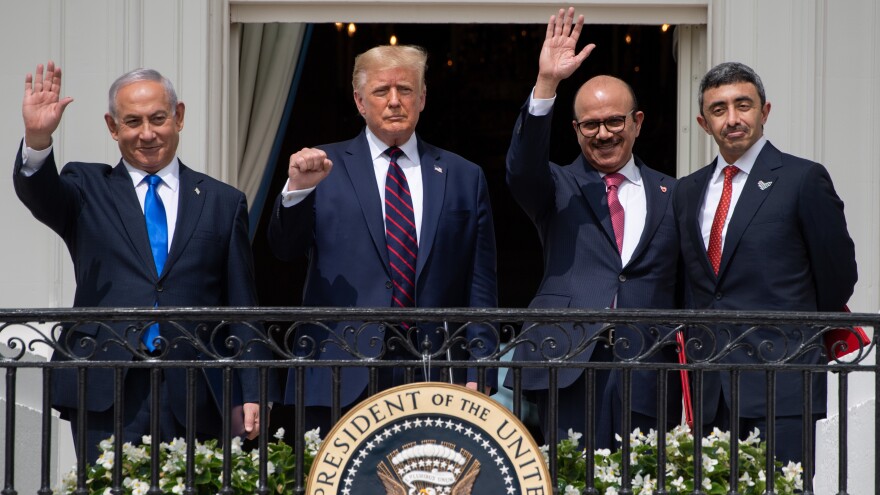Israeli Prime Minister Benjamin Netanyahu and representatives of Bahrain and the United Arab Emirates officially opened normal relations Tuesday, signing diplomatic agreements during a White House ceremony that was hosted by President Trump.
"The blessings of the peace we make today will be enormous," Netanyahu said. "First, because this peace will eventually expand to include other Arab states and, ultimately, it can end the Arab-Israeli conflict once and for all; second, because the great economic benefits of our partnership will be felt throughout our region; ... and third, because this is not only a peace between leaders — it's a peace between peoples. Israelis, Emiratis and Bahrainis are already embracing one another."
Taken together, the two agreements bring "a pivot in history," Netanyahu said, standing alongside Trump on the balcony of the White House's Blue Room and addressing a large crowd watching from the South Lawn below.
The Trump administration brokered the accords between the Middle East nations, which had not been at war and were already cooperating quietly on some security and economic issues.
Palestinian leaders have repeatedly asked Arab countries to withhold establishing ties with Israel until a mutual peace is reached between Israel and the Palestinians. But the Trump administration's effort to bring about that deal has not progressed, and it has turned its focus to bringing Arab states into closer relations with Israel.
The agreements between the three countries reportedly involve opening embassies and increasing trade between them. The exact terms of the accords were not made public before the signing ceremony.
"I stand here today to extend a hand of peace and receive a hand of peace," said Abdullah bin Zayed Al Nahyan, the United Arab Emirates' minister of foreign affairs and international cooperation.
With the new agreement, he said, "we are already witnessing a change in the heart of the Middle East — a change that will send hope around the world."
Also speaking was Bahraini Foreign Minister Abdullatif bin Rashid Al Zayani, who called it a historic step toward a lasting peace.
"For too long, the Middle East has been set back by conflict and mistrust, causing untold destruction and thwarting the potential of generations of our best and brightest young people," he said. "Now I'm convinced we have the opportunity to change that."
After a round of speeches, the officials and Trump sat down at a long table to sign three copies of each agreement, including versions in Arabic and Hebrew. That prompted a moment of levity, as Netanyahu and the Arab officials asked one another to point out where they should sign their names.
"I said clearly that the nations of the regions had to decide what kind of a future they wanted for their children and for their families and for their nation itself," Trump said just before the signing ceremony.
"They are choosing a future in which Arabs and Israelis, Muslims, Jews and Christians, can live together, pray together and dream together side by side in harmony, community and peace," the president said.
During the White House event, a rocket attack was unleashed on Israel. NPR's Daniel Estrin says, "Gaza militants fired rockets toward the southern Israeli city of Ashdod, according to the Israeli army. Israeli emergency services say at least two Israelis were lightly wounded from shattered glass."
Copyright 2021 NPR. To see more, visit https://www.npr.org. 9(MDEwMTk5OTQ0MDEzNDkxMDYyMDQ2MjdiMw004))




